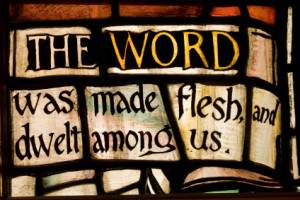 Forget for a moment that you live 2000 years after the death of Jesus Christ on the cross, and forget that you have the New Testament which tells you about who Jesus was and what He did. Imagine that you pick up an ancient history book and it tells you about three men who were put to death around 33 BC for religious and political crimes. Two of them were criminals and one was a rabble-rouser, a trouble-maker, and a blasphemer. If you knew nothing else about these three men, you would assume they were most likely guilty.
Forget for a moment that you live 2000 years after the death of Jesus Christ on the cross, and forget that you have the New Testament which tells you about who Jesus was and what He did. Imagine that you pick up an ancient history book and it tells you about three men who were put to death around 33 BC for religious and political crimes. Two of them were criminals and one was a rabble-rouser, a trouble-maker, and a blasphemer. If you knew nothing else about these three men, you would assume they were most likely guilty.
Imagine furthermore that rather than living 2000 years after the fact, you were a Jewish person who lived at the time of Jesus. If you had heard anything from the Jewish rabbis of your day, you would know that this man named Jesus was a threat to the peace, order, safety, and security of your life within the Roman Empire.
If Jesus was the Messiah, as He claimed, He would rise up in revolt against the Roman invaders, but since He clearly did not want to go to war with the Romans, and since He often said things that directly challenged the traditions and teachings of the religious leaders, and sometimes He even seemed to say blasphemous things about the Temple and about YHWH Himself, well, Jesus was guilty. He had to die because He was guilty.
And when He did die, they hung Him on a cross. It was a gruesome sight, but that was evidence enough of His guilt. God had seen fit to judge this blasphemer named Jesus by hanging Him on a tree, for as the Scriptures say, “Cursed is everyone who hangs on a tree.”
Yes, this was evidence that God also was upset about what this man named Jesus was teaching, and had seen fit to make Him a public spectacle in the sight of all so that nobody would ever again seek to challenge the teachings of the religious leaders or the traditions of the Jewish people.
Yes, if you were a Jew living 2000 years ago, and if you saw Jesus hanging on the cross, you most likely would have thought that He was a guilty criminal who had come under the curse of God. You would be revolted and sickened by His appearance.
But looking back now, we know that Jesus was not guilty. He did not sin. He died a criminal’s death because He went there willingly, as a sacrifice for the sins of the whole world, to take our sins upon Himself and bear them into death. But we only know this because Jesus rose from the dead and told His disciples that this is what happened, and the disciples taught it to others and wrote about it in the Bible, and the Apostle Paul—the greatest theologian in history—wrote about this theme in many of his letters.

So it is also with God.
From our human perspective, a God who enters into human affairs in the way that God did in the Old Testament looks guilty. Just like Jesus on the cross. As outsiders, when we look upon the appearance of God in the Old Testament, we see a guilty criminal who is doing things that nobody should ever do. This also is exactly the way some people looked at Jesus. When we read about some of the brutal and bloody things that the Israelites did in God’s name, God appears ugly and revolting. In many of the depictions there is no beauty or comeliness, that we should desire Him. He is despised and rejected by many. We do not esteem Him. Just like Jesus (cf. Isa 53:1-3).



